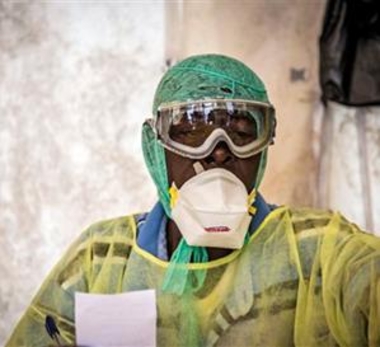US: Ebola cases could hit 1.4 million by mid-Jan.

London (AP) — New estimates by the World Health Organization and the U.S. health agency are warning that the number of Ebola cases could soar dramatically — the U.S. says up to 1.4 million by mid-January in two nations alone — unless efforts to curb the outbreak are significantly ramped up.
Since the first cases were reported six months ago, the tally of cases in West Africa has reached an estimated 5,800 illnesses and over 2,800 deaths. But the U.N. health agency has warned that tallies of recorded cases and deaths are likely to be gross underestimates of the toll that the killer virus is wreaking on West Africa.
The U.N. health agency said Tuesday that the true death toll for Liberia, the hardest-hit nation in the outbreak, may never be known, since many bodies of Ebola victims in a crowded slum in the capital, Monrovia, have simply been thrown into nearby rivers.
In its new analysis, WHO said Ebola cases are rising exponentially and warned the disease could sicken people for years to come without better control measures. The WHO's calculations are based on reported cases only.
The U.S. Centers for Disease Control and Prevention, however, released its own predictions Tuesday for the epidemic's toll, based partly on the assumption that Ebola cases are being underreported. The report says there could be up to 21,000 reported and unreported cases in Liberia and Sierra Leone alone by the end of this month and that cases could balloon to as many as 1.4 million by mid-January.
Experts caution those predictions don't take into account response efforts.
The CDC's numbers seem "somewhat pessimistic" and do not account for infection control efforts already underway, said Dr. Richard Wenzel, a Virginia Commonwealth University scientist who formerly led the International Society for Infectious Diseases.
In recent weeks, health officials worldwide have stepped up efforts to provide aid, but the virus is still spreading. There aren't enough hospital beds, health workers or even soap and water in the hardest-hit West African countries: Guinea, Sierra Leone and Liberia.
Last week, the U.S. announced it would build more than a dozen medical centers in Liberia and send 3,000 troops to help. Britain and France have also pledged to build treatment centers in Sierra Leone and Guinea and the World Bank and UNICEF have sent more than $1 million worth of supplies to the region.
"We're beginning to see some signs in the response that gives us hope this increase in cases won't happen," said Christopher Dye, WHO's director of strategy and co-author of the study published by the New England Journal of Medicine, who acknowledged the predictions come with a lot of uncertainties.
"This is a bit like weather forecasting. We can do it a few days in advance, but looking a few weeks or months ahead is very difficult."
WHO also calculated the death rate to be about 70 percent among hospitalized patients but noted many Ebola cases were only identified after they died. Dye said there was no proof Ebola was more infectious or deadly than in previous outbreaks.
Outside experts questioned WHO's projections and said Ebola's spread would ultimately be slowed not only by containment measures but by changes in people's behavior.
"It's a big assumption that nothing will change in the current outbreak response," said Dr. Armand Sprecher, an infectious diseases specialist at Doctors Without Borders.
"Ebola outbreaks usually end when people stop touching the sick," he said. "The outbreak is not going to end tomorrow but there are things we can do to reduce the case count."
Local health officials have launched campaigns to educate people about the symptoms of Ebola and not to touch the sick or the dead.
Sprecher was also unconvinced that Ebola could continue causing cases for years. He said diseases that persist for years usually undergo significant changes to become less deadly or transmissible.
Dye and colleagues wrote they expected the numbers of cases and deaths from Ebola to continue rising from hundreds to thousands of cases per week in the coming months — and reach 21,000 by early November. He said it was worrisome that new cases were popping up in areas that hadn't previously reported Ebola, like in parts of Guinea.
Scientists said the response to Ebola in the next few months would be crucial.
"The window for controlling this outbreak is closing," said Adam Kucharski, a research fellow in infectious disease epidemiology at the London School of Hygiene and Tropical Medicine.
___
by Maria Cheng, AP Medical Writer
Copyright 2014 The Associated Press. All rights reserved. This material may not be published, broadcast, rewritten or redistributed.
The Gayly – September 23, 2014 @ 10:45am





